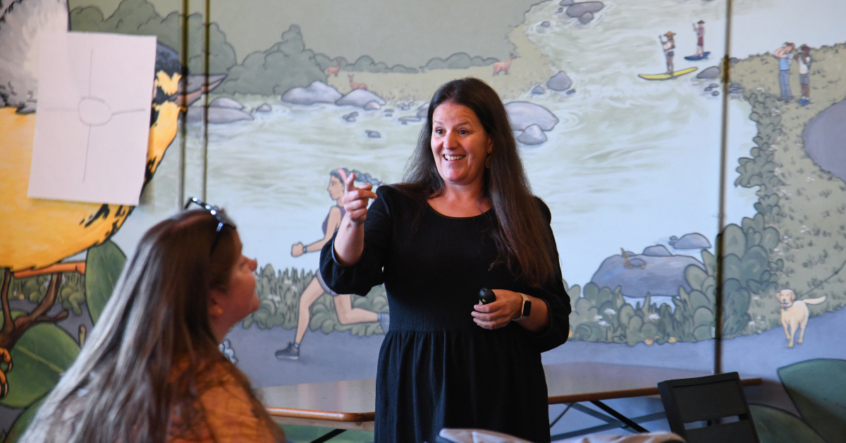What can football teach us about succession planning for business? Quite a lot, it turns out. According to executive and leadership coach Katie Beach, when it comes to talent development, business owners can take a page from the coaching playbook.
Katie Beach has over 20 years of experience working with teams and developing leaders. She runs Katie Beach Consulting, where she leverages her diverse background in Division I athletics, healthcare, career services, and economic development in her work as a speaker, trainer, coach, and facilitator.
Katie is also an active member of the Roanoke-Blacksburg innovation ecosystem! We were thrilled to sit down with Katie for an interview as she shared her unique expertise around talent development and succession planning.
What is succession planning and why is it important?
In broad terms, succession planning is a company’s process for ensuring they are able to fill critical roles when team members leave. It’s very entwined with talent development. When Covid hit, a lot of industries were left with leadership gaps because we hadn’t planned for people to leave. What we found was that it wasn’t the technical skills that were missing, it was the softer, people management skills like running an effective a meeting, having an internal one-on-one, or conducting a performance evaluation.
In athletics, leaders are always planning 2 or 3 years ahead while simultaneously living in the moment. It’s not easy to do, but it keeps their team functioning smoothly. This strategy allows coaches to fill immediate needs because they know who is on their bench and they have a plan to develop them in practice so they’re ready to step in when it matters.
Succession planning is important for a couple of reasons. The first being that it ensures your company can continue to thrive, even if you unexpectedly lose a critical member. But it also serves a second purpose by keeping your team engaged, giving them opportunities and training to grow from being an individual contributor into a transformational leader. When done right, it’s truly a win-win-win for companies, leaders, and for employees.
How can business leaders learn from athletic leaders when it comes to talent development?
One thing athletic leaders tend to do really well is having a plan to scaffold out leadership skills. They give their players the chance to develop and practice important skills and allow points of failure when the pressure isn’t so high. For example, putting in a backup quarterback in when the team is up by 20 points.
In business this looks like understanding the skills, potential, and interest of your team, and giving them opportunities to practice stretching those leadership muscles. This can be leading meetings, presenting to a board, or trying a client-facing role. If you don’t have opportunities for this inside your company, then incentivize volunteering for an association that’s tied to your industry to practice leadership.
How has your background shaped your approach to leadership and talent development?
I spent 15 years as an athletic trainer for undergraduate teams across sports. In other words, I was responsible for the healthcare of athletes from soccer, lacrosse, baseball, football; you name it. While I wasn’t responsible for the personnel decisions, I got a front row seat to that process because when an injury happened, there was a lot of discussion around, ‘Oh my gosh, how are we going to replace this player?’
I watched the leaders who were able to do that well and ones that weren’t as successful. The coaches who were best at talent development were great at seeing the potential they already had. They took existing people on their team and nurtured them into roles they needed filled.
I realized that this approach is highly applicable to a business context and it formed the philosophy behind my speaking, strategic planning facilitation, and even the DiSC team training I lead through Katie Beach consulting.
Can you tell us a little more about your company?
I’m an executive and leadership coach and the founder of Katie Beach Consulting. In my work, I partner with leaders and teams overcome talent or business process challenges and help them reach their full potential. I’m all about facilitating mindset shifts and encouraging actionable change for companies and individuals. It’s something I strive for whether I’m delivering a keynote address, facilitating strategic planning, or leading a DiSC team training.
If a business doesn’t have succession planning in place, what are your top tips to getting started? It’s essential to know your long-term priorities. Then consider how your current team can grow into that strategy. Do you have the right people and are the aligned in the roles they are playing? Try to keep your forecasting achievable by considering your growth plan for the next 18 months to 5 years. If that seems like a bit of stretch, then even thinking one or two quarters ahead can make a big difference.
RBTC seeks ways to increase talent development and recruitment efforts collectively across the region for technology-focused companies and Katie Beach is a powerful resource in that effort! If you’re interested in expanding your network, finding incredible opportunities to grow and contribute to the innovation ecosystem, then RBTC is the perfect place for you. Join us!

